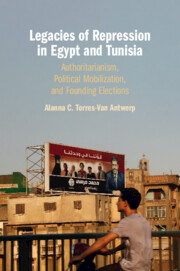 Legacies of Repression in Egypt and Tunisia
Legacies of Repression in Egypt and Tunisia Tracing Founding Elections to Their Authoritarian Roots
Published online by Cambridge University Press: 10 March 2022
The events in Egypt between 2011 and 2013 present a series of empirical puzzles unanswered in the comparative political scholarship: We see puzzling variation with respect to the particular processes of party formation, political mobilization, and opposition group survival or dissolution in the context of regime transitions. These puzzles are particularly evident in Egypt, where a repressed opposition group (the Muslim Brotherhood) won the 2011 founding elections only to be forced from office eighteen months later, while other opposition groups that were active in protesting the Egyptian regime did not even form a political party to run in the 2011 elections. Common explanations for events in Egypt focus on idiosyncratic features of the Egyptian political landscape and fail to explain similar events in other cases in Eastern Europe, Africa, and South America. An approach that takes into account the mechanisms linking the authoritarian past to the events surrounding founding elections offers not only an explanation for events in Egypt but also illuminates comparative cases of founding elections more generally. The book uses comparative process tracing to excavate the mechanisms at play in Egypt and then test them in five comparative cases, linking the authoritarian political ecosystem to the outcome of founding elections.
To save this book to your Kindle, first ensure [email protected] is added to your Approved Personal Document E-mail List under your Personal Document Settings on the Manage Your Content and Devices page of your Amazon account. Then enter the ‘name’ part of your Kindle email address below. Find out more about saving to your Kindle.
Note you can select to save to either the @free.kindle.com or @kindle.com variations. ‘@free.kindle.com’ emails are free but can only be saved to your device when it is connected to wi-fi. ‘@kindle.com’ emails can be delivered even when you are not connected to wi-fi, but note that service fees apply.
Find out more about the Kindle Personal Document Service.
To save content items to your account, please confirm that you agree to abide by our usage policies. If this is the first time you use this feature, you will be asked to authorise Cambridge Core to connect with your account. Find out more about saving content to Dropbox.
To save content items to your account, please confirm that you agree to abide by our usage policies. If this is the first time you use this feature, you will be asked to authorise Cambridge Core to connect with your account. Find out more about saving content to Google Drive.